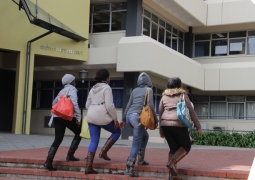
The Portfolio Committee on Higher Education and Training conducted an oversight visit to the University of the Western Cape (UWC) where it inspected the residences at the university.
The Chairperson of the Committee, Ms Connie September, said the Committee wanted to familiarise itself with challenges that resulted following student protests regarding lack of accommodation.
The Committee heard that accommodation is a challenge at UWC that is likely to continue right into the future because demand for student housing far exceeds what is available.
“The university accommodates 3 302 students out of its 22 000 registered student community. Many of the students we register have no financial means to find accommodation even though students make arrangements with landlords in the immediate vicinity,” said the Vice-Chancellor, Prof Tyrone Pretorius.
“Some students do not qualify for residences and some of them do not live in conditions that are conducive for studying at home. The problem is a socio-economic matter as the university does not attract students who could afford residences closer to campus,” he said.
He said the university was for poorer students, 99% of whom are dependent on funding from the National Student Aid Financial Scheme (NSFAS). Members sought clarity on challenges that the university faced following the torching of some buildings on campus. They wanted an update on how the university was overcoming the challenge and what projects are there to remedy the situation. Members also sought clarity on the recent hostage drama that occurred on campus where students held a senior manager against his will, as well as the building students occupied illegally.
Prof Pretorius revealed that the buildings that had recently been burnt by protesting students were not residences – and that the building that was hijacked was mainly for communal services for students.
“They decided to occupy the building but the university management did not feel that it was morally right to evacuate them as they did not have a place to go,” Prof Pretorius said.
He said even if the university started building in 2018, it will take long to meet the accommodation needs of students. He revealed that the university was negotiating with the City of Cape Town and the Province Government to acquire nearby pieces of land that could be used to build residences.
“The City has indicated that it intended building a low-cost housing in one of the pieces of land on the other side of the railway line. This will further compromise the safety of our students,” he said.
The Committee heard that students who are not living on campus sometimes become victims of crime and conditions where they live are not conducive for studying. It heard that one of the buildings that were used to house students belonged to a drug lord in Belhar Township.
Ms September said the Committee is aware of the challenges and that stakeholders needed to focus on solutions. “It is a co-responsibility to safeguard the little resources we have. That requires that we have a common vision of where we want to be as an institution. The Committee appreciates the efforts by the university management to try and improve the student housing situation,” she said.
She encouraged the university to engage other relevant departments and not only the Department of Higher Education and Training on acquiring land or dealing with the security of students in the area. “The planning has to be modelled on the context of human settlements, and the emphasis should be on collaborative effort. For example, you should engage the Sector Education and Training Authority on Built Environment on the new building projects the university is envisaging. Such a scenario will bring down the costs,” she said.
The Committee will later travel to the NSFAS office in Wynberg where it will seek to understand how the entity functions, and how the rollout of the student-centred model is doing.
By Sibongile Maputi
10 August 2017

